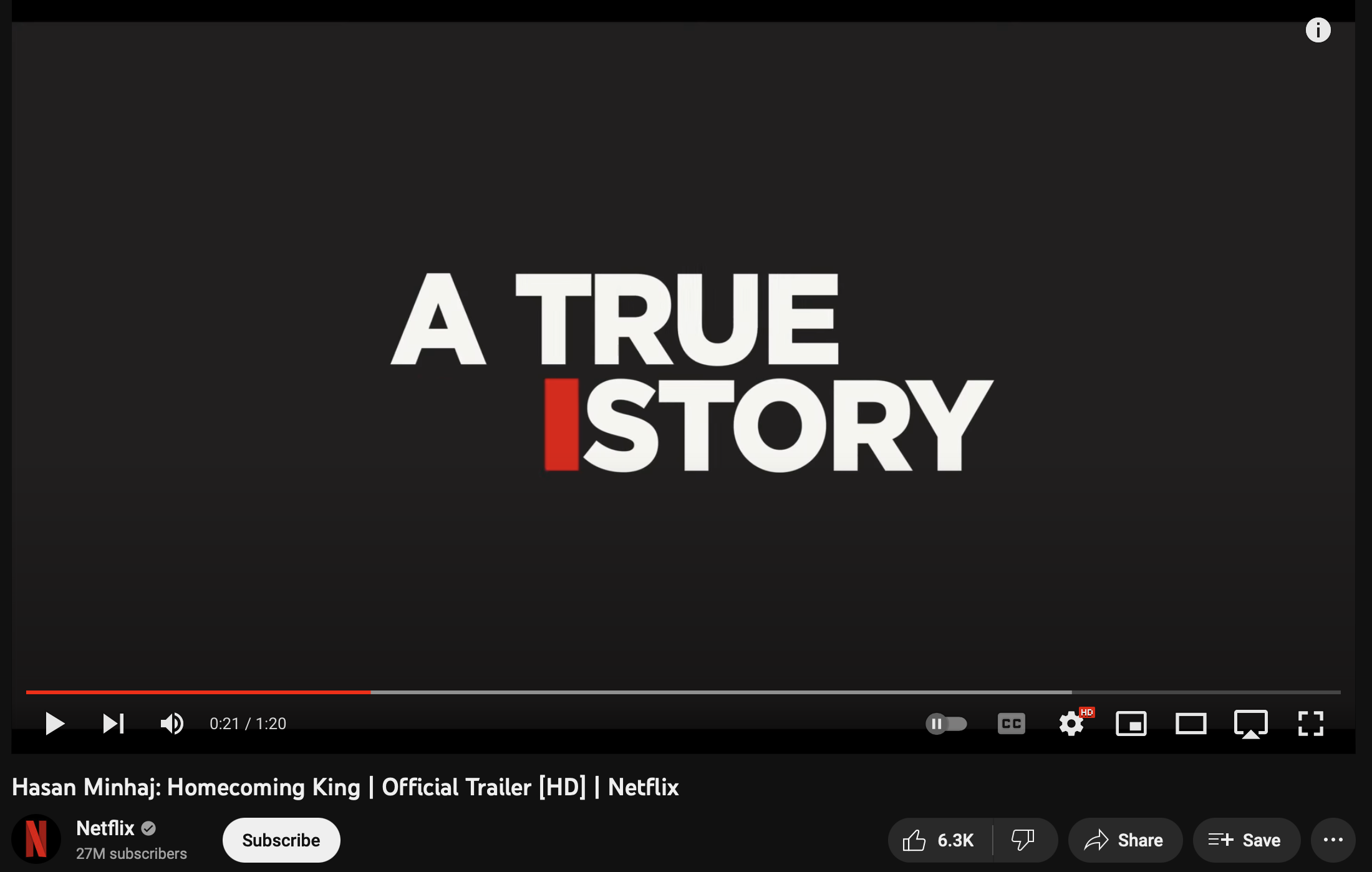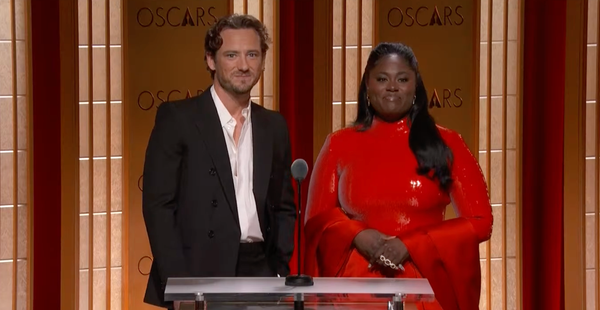Hasan Minhaj Went Too Far
All comedians make things up. But Minhaj's work can't be easily defined as just "comedy."

I’ve been thinking a lot about Claire Malone’s piece on Hasan Minhaj in The New Yorker, in which she investigated the veracity of Hasan Minhaj’s on-stage stories. In addition to hosting comedy shows like The Daily Show and Patriot Act, Minhaj also does one-man shows on stage like Homecoming King and The King’s Jester where he relates experiences from his life in comedic fashion. Malone’s piece identified many instances in which Minhaj had embellished or straight-up invented details.
Here is a subset of the things Minhaj fabricated, as laid out in the piece:
- Anthrax scare - In The King’s Jester, Minhaj talks about how in the wake of a segment on Patriot Act in which he spoke out about the killing of Jamal Khashoggi, an envelope of white powder was sent to his house. When he opened the envelope, the white powder accidentally spilled onto his daughter, who then had to be taken to the hospital. In reality, his daughter was never exposed to any white powder and while Minhaj claims that he actually received white powder in the mail, there is no record of such an event occurring. Minhaj also said he received threatening tweets during this time period, which he displayed on screen during King’s Jester. He admitted to Malone that these tweets were not authentic.
- Minhaj’s Prom - In Homecoming King, Minhaj tells the story of how he asked a girl out for prom who initially accepted. When he showed up the night of prom, he found that another boy was there in his place because her parents didn’t want her taking pictures with a brown boy. In reality, the girl rejected him days earlier. When Minhaj used an actual photo of the girl in his stage show (with her face insufficiently anonymized), she and her family were subjected to online doxxing and threats for years. Minhaj also invited her and her Indian American husband to the stage show without telling her she’d be mentioned in it, presumably to humiliate her.
- The Case of Craig Monteilh - In The King’s Jester, Minhaj details how in the aftermath of 9/11, an undercover FBI informant named Craig Monteilh went by the name of “Brother Eric” and infiltrated his local mosque. In Minhaj’s telling, he decided to mess with Brother Eric by telling him he was thinking of getting his pilot’s license, which led to Minhaj getting apprehended by police. In reality, while Monteilh was an actual informant, Minhaj and Monteilh never encountered each other.
- Jared Kushner Is a Jerk - In The King’s Jester, Minhaj relates a story of attending the Time 100 Gala where an oblivious Jared Kushner sat in a seat that had been ceremonially kept empty for an activist. Minhaj then publicly criticized Kushner from the stage. While that latter part did occur, there was no ceremonially empty seat.
For his part, Minhaj has been defiant and unrepentant. He defended his lies to The New Yorker by saying he was getting at the “emotional truth” of the matters discussed. He also issued a statement to Rolling Stone:
Yes, I was rejected from going to prom because of my race. Yes, a letter with powder was sent to my apartment that almost harmed my daughter. Yes, I had an interaction with law enforcement during the war on terror. Yes, I had varicocele repair surgery so we could get pregnant. Yes, I roasted Jared Kushner to his face. I use the tools of standup comedy—hyperbole, changing names and locations, and compressing timelines to tell entertaining stories. That’s inherent to the art form. You wouldn’t go to a Haunted House and say ‘Why are these people lying to me?’ — The point is the ride. Standup is the same.
I made a video on Tiktok and Instagram expressing my disappointment with Minhaj. Hundreds of the comments I received can basically be summed up as: “Who cares, it’s stand-up comedy, people invent things!”
My response to that boils down to two questions: Is it stand-up comedy, though? And what is the nature of the fabrication?
Is it stand-up comedy?
I love stand-up comedy. I’ve seen dozens of comedians perform live and I watch/listen to comedy specials regularly. In a piece about the New Yorker article, Jason Zinoman details how many comedians have different standards — some will tell the truth religiously while others will embellish or lie, and even proudly say they do so. I feel like my personal expectations are set appropriately: Most comedians invent shit on stage so their material is funnier. So why should Minhaj be any different?
The New Yorker piece makes it clear that Minhaj believes he’s operating in a different mode when he’s doing his one-man shows vs. hosting something like Patriot Act:
During our meeting, Minhaj drew a hard line between his hosting duties on “Patriot Act” and his stage work. In his Netflix specials, he said, he was allowed to create characters and events in service of storytelling, to sharpen his social points. The “emotional truth,” he told me, repeatedly, was more important. But in “Patriot Act,” his comedic license took a back seat to the information being conveyed. He seemed to sidestep the possibility that most people likely don’t parse which Hasan Minhaj they’re watching at a given moment.
I agree with the latter statement. Minhaj’s one-man shows and his work on shows like The Patriot Act and The Daily Show feel pretty similar in tone. Each persona he adopts feels like a natural extension of the other. In Patriot Act, Minhaj positions himself as a wry observer who speaks truth to power on topics like Saudi Arabia and immigration. His one-man shows mention or discuss similar matters from a more personal perspective. But it’s hard to speak truth to power when you’re not speaking the truth at all.
Even if we judge Minhaj under his preferred rubric and differentiate between his news stuff and his other on-stage work, I still find his actions manipulative and inappropriate. In Homecoming King and Patriot Act, Minhaj’s work defies easy categorization. Yes, he tells jokes that are clearly intended to make people laugh, but he also fluctuates frequently between comedic bits and extended dramatic monologues, between the light-hearted and the serious. To describe it as “stand-up comedy” does a disservice to that genre and to any others you might ascribe to him. It is simply too imprecise a term. As Jason Zinoman writes:
All artists teach their audience how to view them, by the way they tell jokes, their style, the level of absurdity. What makes Hasan Minhaj such a troubling example is that his style, onstage and often off in interviews, suggested we should believe him. Minhaj is known for using visual aids the way a journalist would. He mixes clips of television news and photos from his life with a general tone of sincerity. The nature of his deceptions was peculiar. He didn’t invent stuff to make himself funnier. He did it to raise the stakes in the easiest, most self-regarding way possible.
Minhaj’s stories have power because we think they are true. Minhaj knows this. Otherwise, why lie and say they’re real? We all understand implicitly that someone telling you a true story is more interesting than someone telling you something they just made up. Minhaj and Netflix understand this too, which is why they chose to market Homecoming King like this:

So is Minhaj’s work actually stand-up comedy or is it dramatic storytelling or is it political commentary or is it an on-stage performance of a memoir? My answer is yes.
What is the nature of the fabrication?
It’s one thing to invent an encounter at your local supermarket with a cashier. It’s another to make up hate crimes.
Minhaj’s fabrications dealt with real-life individuals and recognizable events. For these topics, I think the standard for truth should be higher because the stakes are higher. Is Jared Kushner a lying, insensitive asshole? Probably! But that doesn’t mean you should also become one in order to take him down. Did Minhaj experience danger in the wake of speaking out about Saudi Arabia? I have no doubt. But I don’t think you should make up a story about your daughter getting hospitalized to land that point?
One of the most difficult things someone can encounter when dealing with discrimination is being believed. With this in mind, Minhaj’s work really does a disservice to the immigrant community he purports to represent. Minhaj told stories that he felt were “emotional truths” but in lying about the details, he’s made it more difficult for anyone else to be believed when they are actually suffering from oppression. That he doesn’t seem to understand this fact is breathtaking to me and forces me to reconsider my estimation of the man.
The question I’d ask people who are fine with folks like Minhaj making stuff up is this: Is there a line anywhere? Is there anything you don’t think it’s okay to make up? Because if the answer is yes, I’d suggest we draw the line here: Don’t make up stuff about hate crimes. Don’t use your platform to invent stories about real people who are not in the public eye and then allow your audience to attack and harass them. Don’t fabricate terrorist attacks on your children. If we can’t have good comedy even with these guidelines, then maybe there’s something wrong with the art form.
Minhaj wants the praise and awards that come with being an incisive commentator on serious issues but he doesn’t want the accompanying responsibility. Everyone is welcome to draw their own conclusions about how to handle the stuff uncovered in the New Yorker article. As for me, I can’t take the guy seriously anymore. Maybe I never should’ve.
Additional Reading
Thanks for reading Decoding Everything! If you got something out of this piece, please consider sharing it or subscribing.
Other Stuff David Chen Has Made
- On The Filmcast, we reviewed Bottoms with BJ Colangelo. It’s a highly enjoyable comedy!
- On Decoding TV, Patrick Klepek and I continued our coverage of Ahsoka and talked about how [REDACTED] returning to the role that made him famous was kind of beautiful.
- Also on Decoding TV, Patrick and I discussed the first episode of The Continental: From The World of John Wick, which I felt was a promising start.
- [PAID ONLY] On Patreon, I shared a life update and discussed my initial reactions to Dumb Money and The Creator.



